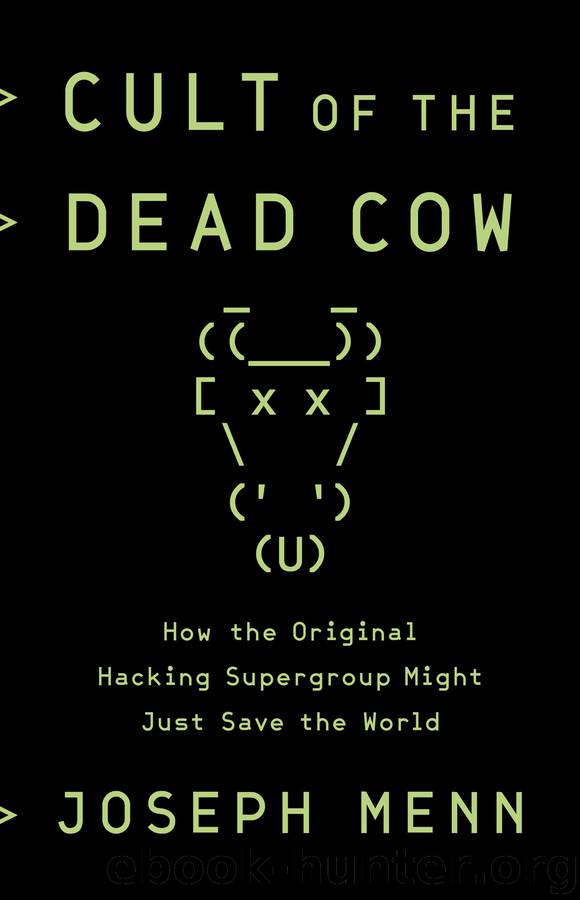Cult of the Dead Cow by Menn Joseph;

Author:Menn, Joseph;
Language: eng
Format: epub
Publisher: Hachette Book Group
Published: 2019-04-05T16:00:00+00:00
Laird also inspired what many independent security experts consider the best model for researching and exposing government use of the internet for repression: the Citizen Lab, at the University of Toronto’s Munk School of Global Affairs. It started with a University of Toronto student, Nart Villeneuve, all the way back in 2001. He had read cDc text files and was following along when the group launched Hacktivismo, soon joining that mailing list. Inspired, he launched a modest website tracking various hacktivism efforts, and he interviewed Laird for a text file of his own. “When I was starting out, I sort of became attracted to the mythical hacker archetype who could do everything,” Villeneuve said. Without a technical background, he was interested in traditional politics and protests. Initially, disruptive tactics like web defacements and denial-of-service attacks made sense to him. But Laird’s writing took him toward “a more constructive side of things,” he said, including getting around censorship. At the time, people in China were complaining that they couldn’t see some of the web, but there was no data about what was off-limits. Villeneuve came up with a way to test for website blocking and wrote a class paper on it for professor Ron Deibert. Deibert encouraged him to build out such software and hired him for what became the nonprofit OpenNet Initiative, which monitored censorship around the world. Then Villeneuve introduced Deibert to Laird.
The two men had long talks about the technological, social, political, and business challenges of keeping the internet as free as John Perry Barlow had declared it to be. They spoke about the need to get and publish objective, detailed information about what was happening inside routers and switches in hostile places. They agreed that the funding model for such a project had to be above reproach, so that it could not be accused of being in the pocket of an intelligence agency or a government. It would need to be able to get the word out to other researchers, the press, and the public, so that political pressure could be brought to bear on the implicated governments as well as companies, many of them based in the West, that provided the tools for censorship and spying.
“Some of our early interactions around hacktivism definitely were important to me in terms of setting up Citizen Lab,” Deibert said. “I was, like Laird, inspired by this hacking in the original sense of the word, combined with some political orientation or morality underneath it. I thought that was very appealing. I think we have the same outlook and philosophy about what’s acceptable and not.”
Major research belonged at a university, Laird argued, because it prioritized scholarship over profit or politics. Like Tor in the practical sphere, a university could take in some government money yet remain clean, as long as it declared its policies. It could also draw on those in multiple disciplines—computer and security experts but also political scientists. It would take a tremendous leap in ambition, since many colleges still didn’t even offer courses in security.
Download
This site does not store any files on its server. We only index and link to content provided by other sites. Please contact the content providers to delete copyright contents if any and email us, we'll remove relevant links or contents immediately.
| Cryptography | Encryption |
| Hacking | Network Security |
| Privacy & Online Safety | Security Certifications |
| Viruses |
Effective Threat Investigation for SOC Analysts by Yahia Mostafa;(6915)
Practical Memory Forensics by Svetlana Ostrovskaya & Oleg Skulkin(6606)
Machine Learning Security Principles by John Paul Mueller(6573)
Attacking and Exploiting Modern Web Applications by Simone Onofri & Donato Onofri(6240)
Operationalizing Threat Intelligence by Kyle Wilhoit & Joseph Opacki(6203)
Solidity Programming Essentials by Ritesh Modi(4201)
Microsoft 365 Security, Compliance, and Identity Administration by Peter Rising(3837)
Operationalizing Threat Intelligence by Joseph Opacki Kyle Wilhoit(3588)
Mastering Python for Networking and Security by José Manuel Ortega(3381)
Future Crimes by Marc Goodman(3376)
Mastering Azure Security by Mustafa Toroman and Tom Janetscheck(3370)
Blockchain Basics by Daniel Drescher(3339)
Learn Computer Forensics - Second Edition by William Oettinger(3328)
Building a Next-Gen SOC with IBM QRadar: Accelerate your security operations and detect cyber threats effectively by Ashish M Kothekar(3063)
Incident Response with Threat Intelligence by Roberto Martínez(3058)
Mobile App Reverse Engineering by Abhinav Mishra(2904)
Mastering Bitcoin: Programming the Open Blockchain by Andreas M. Antonopoulos(2897)
The Code Book by Simon Singh(2868)
From CIA to APT: An Introduction to Cyber Security by Edward G. Amoroso & Matthew E. Amoroso(2804)
